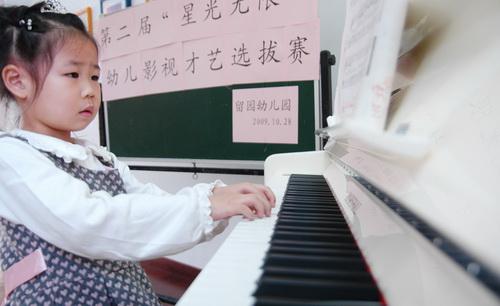BEIJING: Growing number of Chinese parents are willing to fork out to introduce music to their children.
Zuo Jingming is no exception. Like others, she wants her four-year-old daughter to enjoy and cherish music through learning to play the piano, and has set aside 20,000 yuan ($2,930) to buy an entry-level piano.

A girl plays the piano at a musical contest in Suzhou, Jiangsu province. Japanese musical instrument makers are keen on expanding their market share in China as parents invest heavily in introducing music to their kids. [Su Min/For China Daily]
"That is three times the monthly income of my family, yet every family should be committed to invest in their child's education," said Zuo.
This is just an example of how important music education is to some Chinese parents.
China's one-child policy has created a culture where parents invest heavily in their kid's studies and economic prosperity enables such investments.
Some hope that their children will become the next Lang Lang or Li Yundi - professional pianists who are the current darlings of the music industry - while others see learning an instrument as a shortcut to entering a good high school or university.
Banking on this growing trend, Japanese musical instrument makers including Yamaha Music and Electronics Co and Kawai Musical Instruments Manufacturing Co are keen on expanding their market share in China where their revenues recorded 20 percent growth during the economic downturn last year, while sales in Europe and the United States plunged.
Yamaha Music now boasts a 10 percent market share in China and expects its revenue to triple by 2020, said Tetsuya Yoshimi, manager of Yamaha Music and Electronics Co, North China.
China is now already the largest piano market, with half of the world's piano sold in the country. It is estimated that 100 million Chinese children are learning instruments and about 2 percent of Chinese families have a piano at home, compared with 15 to 17 percent in Japan, indicating huge potential in the populous market.
Yamaha sold 33,000 pianos in China last year, representing 1.1 billion yuan in revenue and 17 percent growth year-on-year. By contrast its sales in Japan and Europe decreased 10 percent and 20 percent respectively.
"We are planning on expanding into China's second and third-tier cities by providing more affordable products to customers in the region," said Yoshimi.
Yamaha is also hoping on increasing its piano sales in China to 50,000 units per year from the current 30,000 units.
Yamaha used to position itself as a high-end instrument manufacturer, with one piano costing as much as 1.15 million yuan - far beyond the affordability of most Chinese families.
Piano dealers usually recommend domestic brands such as Pearl River or Hailun for entry-level learners. A basic Pearl River piano sells for around 8,000 yuan, well within the budget of the country's burgeoning middle-class household.
Fierce competition from Chinese rivals who are very competitive on price has forced Japanese instrument makers to adjust their pricing strategy.
To cater to different needs in the market, Yamaha is now stretching into the middle-level market with pianos priced from 17,000 yuan to 1.15 million yuan per unit.
In the meantime, Kawai, Yamaha's major competitor, also saw its sales in China increase 16 percent last year while markets in the US and Europe shrunk by over 30 percent and 20 percent respectively.





